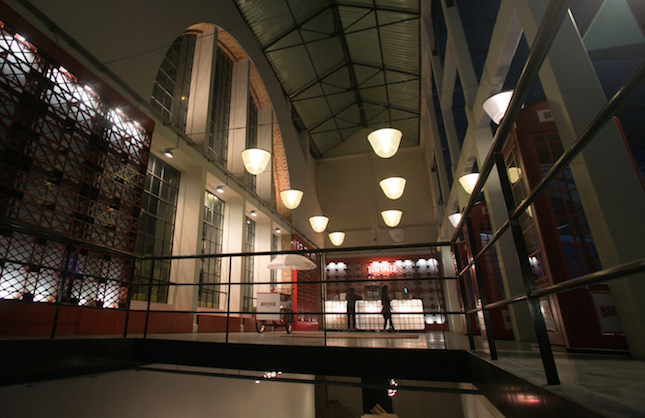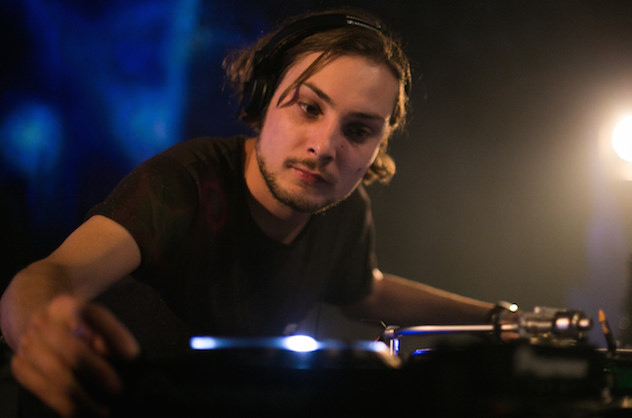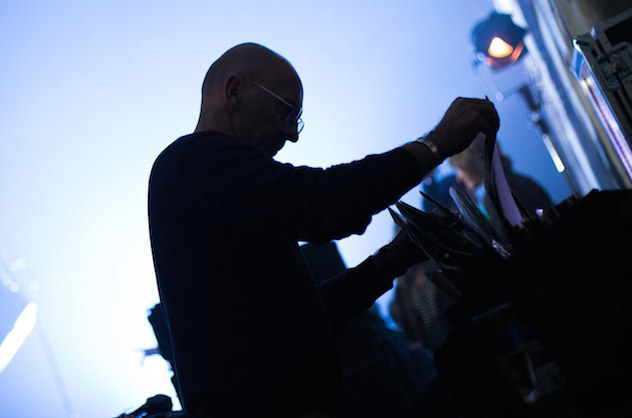- Livraria Ler Devagar in Lisbon isn't your average bookshop. Its name, which translates roughly to "the read slowly bookshop," only tells half the story. There's a bar in plain view as soon as you walk in, and a restaurant hidden away towards the back of the building, which I only stumbled across late into my trip. By far its most striking feature, though, is the defunct newspaper printing press on the second floor, a grey, hulking bit of machinery that speaks to the history of this corner of the city. The scene back downstairs, meanwhile, is very much its present.
Ler Devagar is one of dozens of artsy shops in LX Factory, a former industrial zone in the Alcântara area that's been transformed into a trendy, creative hub. (Brits, think of a more polished version of Brick Lane.) As well as the usual shops, bars and restaurants, it's home to advertising and talent agencies, a karate dojo and a vast warehouse, which hosts a conveyer belt of corporate events, exhibitions and gigs. Last weekend, this space became the main room for Lisboa Dance Festival, a new two-day electronic music event that presented international house and techno artists alongside a large and diverse cast of local acts.
 The action went down across four spaces of varying sizes, ranging from the cavernous XL Factory to upstairs at BI+CA, a tiny room above a café that usually houses rental bikes. (There was a fifth venue, Ministerium Club, located a short cab ride away that hosted afterhours parties.) Onsite, walking from one space to the other never took longer than a couple of minutes, beers were €2, and the sound across the board was impressively loud. But what really brought the experience to life were the surrounding bars and restaurants, many of which (like Ler Devagar) stayed open until 2 or 3 AM especially. I arrived at midnight on Friday and spent the first hour or so bar-hopping, happy to be able to yo-yo with such ease between full-on dance floors and authentic, tranquil spots.
For whatever reason, nearly all of the festival's heavy-hitters were billed on the Saturday night, leaving the overall programme a bit lopsided, at least on paper. But in the end it was the Friday that won out musically, thanks to sets by several Portuguese acts I'd never heard of. DJ trio Discos Extendes had BI+CA jumping with an on-point blend of summery house, while over the road at Zoot—normally the karate dojo—teenager Dotorado Pro let loose a barrage of marimba-heavy Afro-house and dancehall, including his own smash hit, "African Scream." The strong vibes continued at NormaJean, a ground-level rectangle whose sweaty, smoky atmosphere gave it a wicked house party feel. I saw two DJs here, Black and Tiago, both repping for local label Interzona 13 with sets of fuzzy techno and house.
The action went down across four spaces of varying sizes, ranging from the cavernous XL Factory to upstairs at BI+CA, a tiny room above a café that usually houses rental bikes. (There was a fifth venue, Ministerium Club, located a short cab ride away that hosted afterhours parties.) Onsite, walking from one space to the other never took longer than a couple of minutes, beers were €2, and the sound across the board was impressively loud. But what really brought the experience to life were the surrounding bars and restaurants, many of which (like Ler Devagar) stayed open until 2 or 3 AM especially. I arrived at midnight on Friday and spent the first hour or so bar-hopping, happy to be able to yo-yo with such ease between full-on dance floors and authentic, tranquil spots.
For whatever reason, nearly all of the festival's heavy-hitters were billed on the Saturday night, leaving the overall programme a bit lopsided, at least on paper. But in the end it was the Friday that won out musically, thanks to sets by several Portuguese acts I'd never heard of. DJ trio Discos Extendes had BI+CA jumping with an on-point blend of summery house, while over the road at Zoot—normally the karate dojo—teenager Dotorado Pro let loose a barrage of marimba-heavy Afro-house and dancehall, including his own smash hit, "African Scream." The strong vibes continued at NormaJean, a ground-level rectangle whose sweaty, smoky atmosphere gave it a wicked house party feel. I saw two DJs here, Black and Tiago, both repping for local label Interzona 13 with sets of fuzzy techno and house.
 In addition to the music, Lisboa Dance Festival hosted a small market (vinyl stalls, food trucks, a pop-up hairdresser) and a compact programme of talks, which, I realised at the last minute, were all in Portuguese. That error meant that I was at LX Factory from 5 PM on Saturday, when the pace was lazier and the streets more filled with families. I moseyed about for a few hours, until the sound of Kendrick Lamar's "King Kunta" had me clambering up the steps to BI+CA. It was only 8 PM, but the room was packed with locals throwing self-conscious shapes to a run of big US hip-hop and trap anthems (after "King Kunta," the DJ, DarkSunn, dropped another four Lamar tracks.) It was a short, overindulgent session—the musical equivalent of gorging on McDonald's—but it got me back in the mood.
The night wildly peaked and troughed from there, ending on a high with Sven Väth's headline slot in the main room. Despite its all-star lineup—Motor City Drum Ensemble, Prosumer, Move D, Väth—the space didn't properly fill up until the final few hours, due in part to a football match between Lisbon's two biggest teams that ran until just before 11 PM. Even though MCDE and Prosumer were both on classy form, they played to small crowds on a soundsystem that boomed because of a lack of bodies. Elsewhere, showcases from two of the city's best-known underground labels—Assemble Music and Príncipe—didn't live up to the hype, the former too loopy, the latter, centered around a back-to-back from DJ Lilocox and DJ Maboku, too samey. Were it not for Väth and his ability to charge every room he plays with a thrilling rave energy, the night might have been a disappointment.
In addition to the music, Lisboa Dance Festival hosted a small market (vinyl stalls, food trucks, a pop-up hairdresser) and a compact programme of talks, which, I realised at the last minute, were all in Portuguese. That error meant that I was at LX Factory from 5 PM on Saturday, when the pace was lazier and the streets more filled with families. I moseyed about for a few hours, until the sound of Kendrick Lamar's "King Kunta" had me clambering up the steps to BI+CA. It was only 8 PM, but the room was packed with locals throwing self-conscious shapes to a run of big US hip-hop and trap anthems (after "King Kunta," the DJ, DarkSunn, dropped another four Lamar tracks.) It was a short, overindulgent session—the musical equivalent of gorging on McDonald's—but it got me back in the mood.
The night wildly peaked and troughed from there, ending on a high with Sven Väth's headline slot in the main room. Despite its all-star lineup—Motor City Drum Ensemble, Prosumer, Move D, Väth—the space didn't properly fill up until the final few hours, due in part to a football match between Lisbon's two biggest teams that ran until just before 11 PM. Even though MCDE and Prosumer were both on classy form, they played to small crowds on a soundsystem that boomed because of a lack of bodies. Elsewhere, showcases from two of the city's best-known underground labels—Assemble Music and Príncipe—didn't live up to the hype, the former too loopy, the latter, centered around a back-to-back from DJ Lilocox and DJ Maboku, too samey. Were it not for Väth and his ability to charge every room he plays with a thrilling rave energy, the night might have been a disappointment.
 Lisboa Dance Festival has come at an interesting time for the Portuguese capital. The city is fast becoming one of Europe's most popular holiday destinations, and you can see why: it's beautiful, cheap and mostly sunny, with the scrappy, friendly charm of Berlin or Bucharest. The festival also lands at a good time of the year—Portugal has a handful of popular summer electronic festivals, but offers little during the winter months. The organisers have positioned it as a sort of mini-Nuits Sonores: an event of varied programming that makes good use of the city's industrial past while shining a light on its musical present. But if it's to grow to the size and stature of the Lyon festival and others like it, it'll first have to learn the singular importance of a water-tight booking policy.
Lisboa Dance Festival has come at an interesting time for the Portuguese capital. The city is fast becoming one of Europe's most popular holiday destinations, and you can see why: it's beautiful, cheap and mostly sunny, with the scrappy, friendly charm of Berlin or Bucharest. The festival also lands at a good time of the year—Portugal has a handful of popular summer electronic festivals, but offers little during the winter months. The organisers have positioned it as a sort of mini-Nuits Sonores: an event of varied programming that makes good use of the city's industrial past while shining a light on its musical present. But if it's to grow to the size and stature of the Lyon festival and others like it, it'll first have to learn the singular importance of a water-tight booking policy.
 The action went down across four spaces of varying sizes, ranging from the cavernous XL Factory to upstairs at BI+CA, a tiny room above a café that usually houses rental bikes. (There was a fifth venue, Ministerium Club, located a short cab ride away that hosted afterhours parties.) Onsite, walking from one space to the other never took longer than a couple of minutes, beers were €2, and the sound across the board was impressively loud. But what really brought the experience to life were the surrounding bars and restaurants, many of which (like Ler Devagar) stayed open until 2 or 3 AM especially. I arrived at midnight on Friday and spent the first hour or so bar-hopping, happy to be able to yo-yo with such ease between full-on dance floors and authentic, tranquil spots.
For whatever reason, nearly all of the festival's heavy-hitters were billed on the Saturday night, leaving the overall programme a bit lopsided, at least on paper. But in the end it was the Friday that won out musically, thanks to sets by several Portuguese acts I'd never heard of. DJ trio Discos Extendes had BI+CA jumping with an on-point blend of summery house, while over the road at Zoot—normally the karate dojo—teenager Dotorado Pro let loose a barrage of marimba-heavy Afro-house and dancehall, including his own smash hit, "African Scream." The strong vibes continued at NormaJean, a ground-level rectangle whose sweaty, smoky atmosphere gave it a wicked house party feel. I saw two DJs here, Black and Tiago, both repping for local label Interzona 13 with sets of fuzzy techno and house.
The action went down across four spaces of varying sizes, ranging from the cavernous XL Factory to upstairs at BI+CA, a tiny room above a café that usually houses rental bikes. (There was a fifth venue, Ministerium Club, located a short cab ride away that hosted afterhours parties.) Onsite, walking from one space to the other never took longer than a couple of minutes, beers were €2, and the sound across the board was impressively loud. But what really brought the experience to life were the surrounding bars and restaurants, many of which (like Ler Devagar) stayed open until 2 or 3 AM especially. I arrived at midnight on Friday and spent the first hour or so bar-hopping, happy to be able to yo-yo with such ease between full-on dance floors and authentic, tranquil spots.
For whatever reason, nearly all of the festival's heavy-hitters were billed on the Saturday night, leaving the overall programme a bit lopsided, at least on paper. But in the end it was the Friday that won out musically, thanks to sets by several Portuguese acts I'd never heard of. DJ trio Discos Extendes had BI+CA jumping with an on-point blend of summery house, while over the road at Zoot—normally the karate dojo—teenager Dotorado Pro let loose a barrage of marimba-heavy Afro-house and dancehall, including his own smash hit, "African Scream." The strong vibes continued at NormaJean, a ground-level rectangle whose sweaty, smoky atmosphere gave it a wicked house party feel. I saw two DJs here, Black and Tiago, both repping for local label Interzona 13 with sets of fuzzy techno and house.
 In addition to the music, Lisboa Dance Festival hosted a small market (vinyl stalls, food trucks, a pop-up hairdresser) and a compact programme of talks, which, I realised at the last minute, were all in Portuguese. That error meant that I was at LX Factory from 5 PM on Saturday, when the pace was lazier and the streets more filled with families. I moseyed about for a few hours, until the sound of Kendrick Lamar's "King Kunta" had me clambering up the steps to BI+CA. It was only 8 PM, but the room was packed with locals throwing self-conscious shapes to a run of big US hip-hop and trap anthems (after "King Kunta," the DJ, DarkSunn, dropped another four Lamar tracks.) It was a short, overindulgent session—the musical equivalent of gorging on McDonald's—but it got me back in the mood.
The night wildly peaked and troughed from there, ending on a high with Sven Väth's headline slot in the main room. Despite its all-star lineup—Motor City Drum Ensemble, Prosumer, Move D, Väth—the space didn't properly fill up until the final few hours, due in part to a football match between Lisbon's two biggest teams that ran until just before 11 PM. Even though MCDE and Prosumer were both on classy form, they played to small crowds on a soundsystem that boomed because of a lack of bodies. Elsewhere, showcases from two of the city's best-known underground labels—Assemble Music and Príncipe—didn't live up to the hype, the former too loopy, the latter, centered around a back-to-back from DJ Lilocox and DJ Maboku, too samey. Were it not for Väth and his ability to charge every room he plays with a thrilling rave energy, the night might have been a disappointment.
In addition to the music, Lisboa Dance Festival hosted a small market (vinyl stalls, food trucks, a pop-up hairdresser) and a compact programme of talks, which, I realised at the last minute, were all in Portuguese. That error meant that I was at LX Factory from 5 PM on Saturday, when the pace was lazier and the streets more filled with families. I moseyed about for a few hours, until the sound of Kendrick Lamar's "King Kunta" had me clambering up the steps to BI+CA. It was only 8 PM, but the room was packed with locals throwing self-conscious shapes to a run of big US hip-hop and trap anthems (after "King Kunta," the DJ, DarkSunn, dropped another four Lamar tracks.) It was a short, overindulgent session—the musical equivalent of gorging on McDonald's—but it got me back in the mood.
The night wildly peaked and troughed from there, ending on a high with Sven Väth's headline slot in the main room. Despite its all-star lineup—Motor City Drum Ensemble, Prosumer, Move D, Väth—the space didn't properly fill up until the final few hours, due in part to a football match between Lisbon's two biggest teams that ran until just before 11 PM. Even though MCDE and Prosumer were both on classy form, they played to small crowds on a soundsystem that boomed because of a lack of bodies. Elsewhere, showcases from two of the city's best-known underground labels—Assemble Music and Príncipe—didn't live up to the hype, the former too loopy, the latter, centered around a back-to-back from DJ Lilocox and DJ Maboku, too samey. Were it not for Väth and his ability to charge every room he plays with a thrilling rave energy, the night might have been a disappointment.
 Lisboa Dance Festival has come at an interesting time for the Portuguese capital. The city is fast becoming one of Europe's most popular holiday destinations, and you can see why: it's beautiful, cheap and mostly sunny, with the scrappy, friendly charm of Berlin or Bucharest. The festival also lands at a good time of the year—Portugal has a handful of popular summer electronic festivals, but offers little during the winter months. The organisers have positioned it as a sort of mini-Nuits Sonores: an event of varied programming that makes good use of the city's industrial past while shining a light on its musical present. But if it's to grow to the size and stature of the Lyon festival and others like it, it'll first have to learn the singular importance of a water-tight booking policy.
Lisboa Dance Festival has come at an interesting time for the Portuguese capital. The city is fast becoming one of Europe's most popular holiday destinations, and you can see why: it's beautiful, cheap and mostly sunny, with the scrappy, friendly charm of Berlin or Bucharest. The festival also lands at a good time of the year—Portugal has a handful of popular summer electronic festivals, but offers little during the winter months. The organisers have positioned it as a sort of mini-Nuits Sonores: an event of varied programming that makes good use of the city's industrial past while shining a light on its musical present. But if it's to grow to the size and stature of the Lyon festival and others like it, it'll first have to learn the singular importance of a water-tight booking policy.